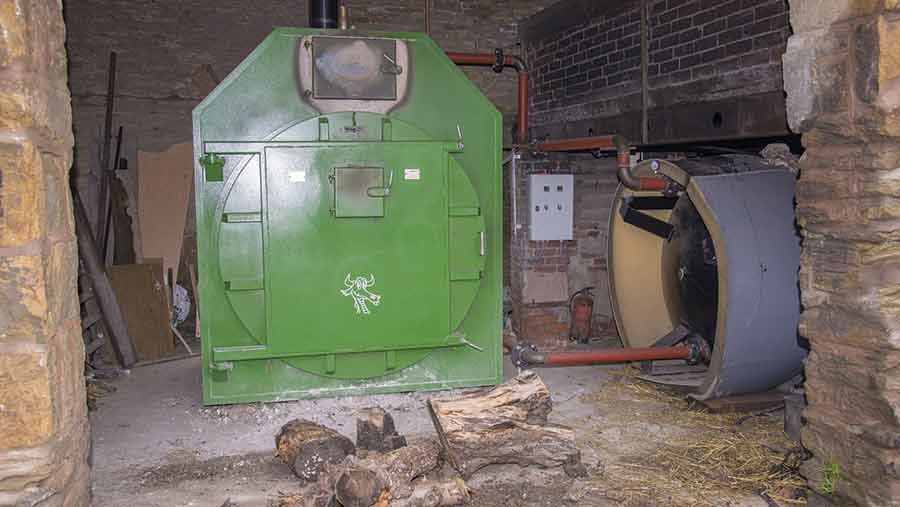Support reforms mean more renewable heat uncertainty
 © John Eveson/FLPA/Rex/ Shutterstock
© John Eveson/FLPA/Rex/ Shutterstock Wide-ranging reforms to the Renewable Heat Incentive (RHI) proposed by government last week (3 March) have again raised the risk for farmers planning to invest in renewable heat projects.
The Department of Energy and Climate Change’s 89-page consultation outlines a host of changes that aim to “rebalance” the RHI and support only the “right renewable heating technology”.
Key proposals include tighter budget limits across the whole scheme from this spring similar to existing Feed-in Tariff caps; ending support for solar thermal; and restricting RHI payments for biogas plants using crop-based feedstocks such as maize silage.
See also: How to comply with rule changes to ensure biomass RHI payments
DECC also wants to alter tariff structures to encourage more “cost-effective” larger renewable heating schemes and move away from the dominance of smaller-scale biomass by slashing some support and introducing a single rate.
Timescale for reform
There are two stages to the proposed changes, which only affect new installations.
Tighter budget controls will be brought in first, from 1 April 2016. These include continuation of the existing degression mechanism (regular tariff cuts when certain deployment triggers are met) alongside a new budget cap.
Government announced last autumn the annual RHI budget will rise from £430m in 2015-16 to £1.15bn in 2020-21, but the scheme could be closed to new entrants if spending is predicted to exceed the cap in any financial year.
DECC will publish monthly updates on predicted spending to help reduce uncertainty for potential investors.
The second stage, effective from spring 2017, includes several changes to specific technologies in the domestic and non-domestic schemes. This includes:
- Merging all biomass tariffs into a single rate of between 2.03-2.90p/kWh for all sizes to encourage larger systems. Currently, large biomass boilers >1MWth receive 2.05p/kWh, while those in the 200kWth-1MWth category get 5.24pkWh and sub-200kW receive 3.62p/kWh
- End solar thermal support (domestic and non-domestic)
- Restrict RHI payments to biogas and biomethane derived only from wastes and residues, or limit payments to a maximum of 50% of the total biogas yield where non-waste feedstocks are used
- Possible review of the budget cap mechanism
- Introduction of a tariff guarantee to allow developers of certain systems to fix tariffs ahead of commissioning – eligible technologies include: Deep geothermal, all biomethane, large biogas (>600kWth), large biomass (>2MW), all biomass combined heat & power, ground and water source heat pumps >100kW
- End support for heat used to dry digestate
- Change basis of annual tariff adjustment from RPI to CPI
Left waiting
The potential for scheme closure at relatively short notice could be one of the biggest concerns for investors not able to access a tariff guarantee.
There could be a short “grace period” of 21 days before any scheme closure comes into effect, which may allow those on the verge of completion to commission and lock into the RHI, but Decc could waive this if there is a surge in deployment.
Any plant which has been granted preliminary accreditation on the non-domestic scheme will not be protected from the budget cap and applications that fail to accredit before scheme closure will join the queue when the scheme reopens in the next financial year.
However, Decc also warns tariff structures or eligibility could change further in the event of scheme closure, so eligibility in subsequent financial years is not automatic.
The consultation closes on 27 April 2016. See https://www.gov.uk/government/consultations/the-renewable-heat-incentive-a-reformed-and-refocused-scheme. Any changes to the budget cap resulting from this consultation could come into effect from next spring.
Mixed reaction
- Frank Aaskov, policy analyst at the Wood Heat Association, warned reducing biomass boiler tariffs by up to 61% would make most biomass heating projects unviable and could cut deployment by 98%
- Alexander Creed, head of energy at Strutt & Parker, welcomed the overall increase in RHI budget to 2021, but said the proposals put extra emphasis on anyone looking to invest in biomass technologies to do so before April 2017
- The Anaerobic Digestion & Bioresources Association welcomed the continuation of support and new tariff guarantees for biomethane and biogas, but was concerned about possible future restrictions on crop use. “We believe all feedstocks can and should play a part in a sustainable, growing AD sector, providing cost-effective green gas and heat at scale,” chief executive, Charlotte Morton said
- The Solar Trade Association hit out at plans to end solar thermal support and urged government to reconsider, especially as interest in the technology was increasing.
The Farm Power project

Changes in policy and support have made renewable energy projects on farms even more challenging. The Farm Power project co-ordinated by Forum for The Future continues to research and promote the idea that every farm has the potential for renewable energy generation.
Over the past year Farmers Weekly has reported on the work of the project and highlighted the opportunities and provided advice on how to overcome some of the barriers.
The future pace and scale of renewable energy development on farm is uncertain. Farm-based schemes are more likely to be viable where a high proportion of energy is used on site or very locally.
While grid access remains a critical issue, projects are progressing and in some cases private arrangements to supply power are being used to by-pass the conventional route. Storage is also moving closer to commercial viability.
The Farm Power project continues at Forum for the Future, where greater community involvement in local generation projects will be a focus this year, with the aim of helping communities plan green energy into their landscapes and lives. For more information visit www.forumforthefuture.org
